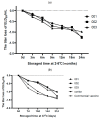Optimization of Heat-Resistance Technology for a Duck Hepatitis Lyophilized Live Vaccine
- PMID: 35214727
- PMCID: PMC8880185
- DOI: 10.3390/vaccines10020269
Optimization of Heat-Resistance Technology for a Duck Hepatitis Lyophilized Live Vaccine
Abstract
In this study, to improve the quality of a live attenuated vaccine for duck viral hepatitis (DHV), the lyophilization of a heat-resistant duck hepatitis virus vaccine was optimized. The optimized heat protectors were made of 10% sucrose, 1.2% pullulan, 0.5% PVP, and 1% arginine, etc., with a titer freeze-drying loss of ≤0.50 Lg. The vaccine product's valence measurements demonstrated the following: the vaccine could be stored at 2-8 °C for 18 months with a virus titer loss ≤0.91 Lg; at 37 °C for 10 days with a virus valence loss ≤0.89 Lg; and at 45 °C for 3 days with a virus titer loss ≤0.90 Lg. Regarding safety, no deaths occurred in two-day-old ducklings immunized with a 10 times dose vaccine; their energy, diet, and weight gain were all normal, demonstrating that the DHV heat-resistant vaccines were safe for ducklings and did not cause any immune side effects. Duck viral hepatitis freeze-dried vaccine began to produce antibodies at 7 d after immunization, reached above 5.0 on 14 d, and reached above 7.0 on 21 d, showing a continuous upward trend. This indicates that duck viral hepatitis vaccine has a good immunogen level. The optimization of the freeze-drying process saves costs and also improves the quality of the freeze-drying products, which provides important theoretical and technical support for the further study of vaccine products.
Keywords: DHV; optimization of the freeze-drying process; stabilizers; thermostability.
Conflict of interest statement
The authors declare that they have no known competing financial interest or personal relationships that could have appeared to influence the work reported in this paper.
Figures






References
-
- Song S., Li P., Zhang R., Chen J., Lan J., Lin S., Guo G., Xie Z., Jiang S. Oral vaccine of recombinant Lactococcus lactis expressing the VP1 protein of duck hepatitis A virus type 3 induces mucosal and systemic immune responses. Vaccine. 2019;37:4364–4369. doi: 10.1016/j.vaccine.2019.06.026. - DOI - PubMed
-
- Levine P., Hofstod M.P. Duck disease investigation. Annu. Rep. N. Y. State Vet. Coll. Ithaca. 1945:55–56.
LinkOut - more resources
Full Text Sources

